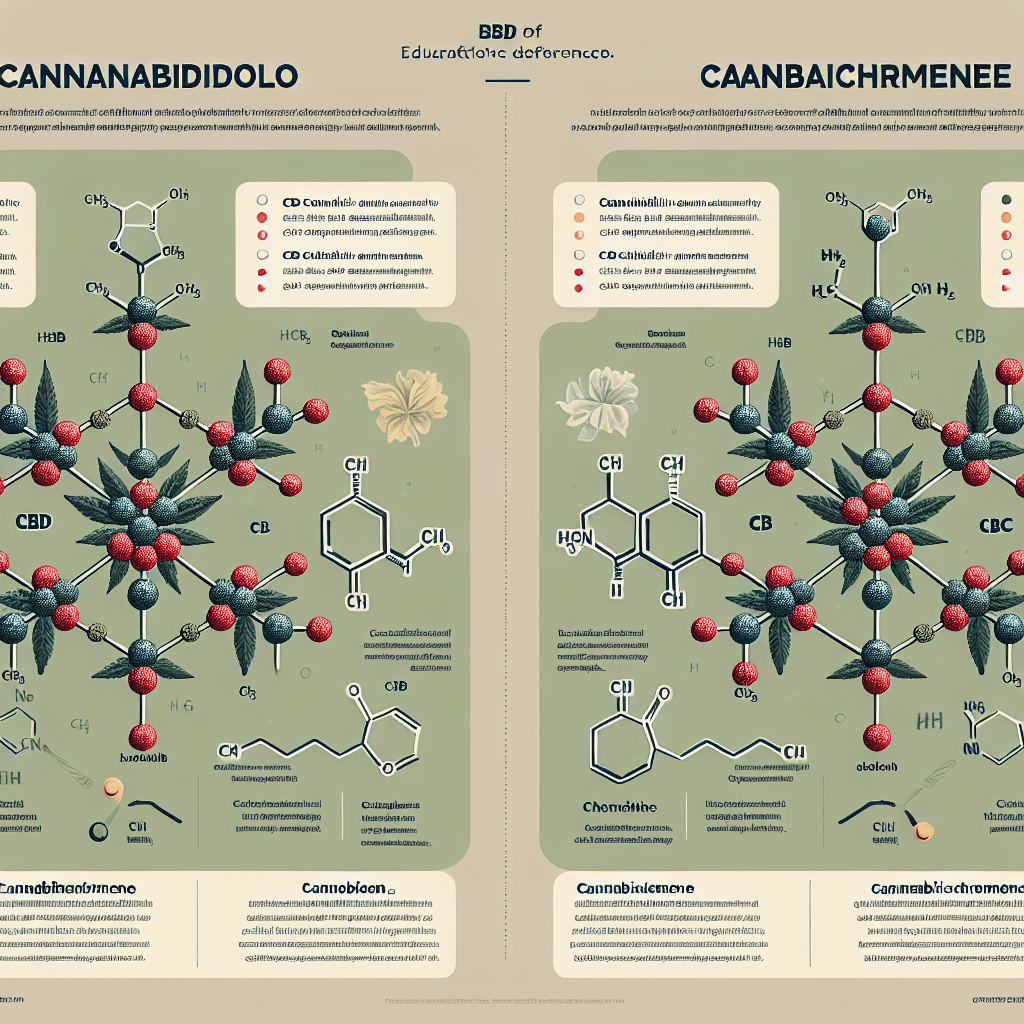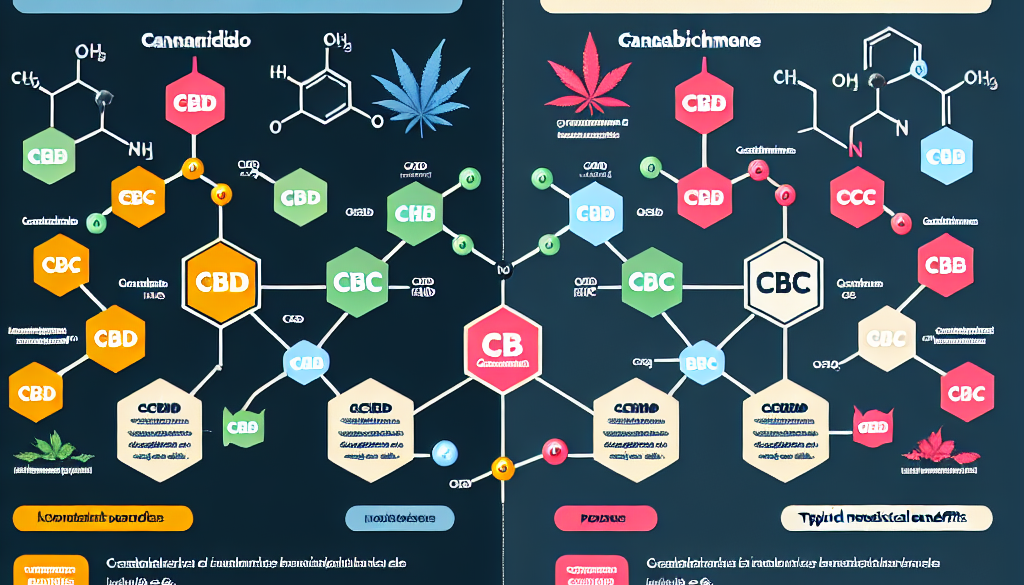What’s the Difference Between CBD and CBC?
-
Table of Contents
- CBD vs. CBC: Understanding the Differences and Benefits
- What is CBD?
- What is CBC?
- Chemical Structure and Interaction with the Body
- Potential Health Benefits
- CBD Benefits
- CBC Benefits
- Research and Case Studies
- Legal Status and Availability
- Conclusion: Key Takeaways on CBD and CBC
- Discover ETChem’s Protein Products
CBD vs. CBC: Understanding the Differences and Benefits

The world of cannabinoids is ever-expanding, with ongoing research revealing more about the potential health benefits of these compounds found in the cannabis plant. Among the plethora of cannabinoids, CBD (cannabidiol) has gained significant popularity for its therapeutic properties without the psychoactive effects associated with THC. However, another lesser-known cannabinoid, CBC (cannabichromene), is also garnering attention for its unique benefits. In this article, we will delve into the differences between CBD and CBC, exploring their properties, benefits, and potential applications.
What is CBD?
CBD is one of the most researched and well-known cannabinoids found in the cannabis plant. Unlike THC (tetrahydrocannabinol), which is known for its psychoactive effects, CBD does not produce a “high.” Instead, it is prized for its potential therapeutic benefits, which include pain relief, anti-inflammatory properties, and anxiety reduction. CBD is available in various forms, such as oils, tinctures, edibles, and topicals, making it accessible for a wide range of uses.
What is CBC?
CBC, or cannabichromene, is another non-psychoactive cannabinoid that has been part of the cannabis research landscape since the 1960s. Though not as well-known as CBD or THC, CBC has shown promise in several areas of health and wellness. It is believed to contribute to the overall effects of cannabis through a phenomenon known as the “entourage effect,” where the combined action of cannabis compounds is greater than the sum of their individual effects.
Chemical Structure and Interaction with the Body
Both CBD and CBC are derived from CBDA (cannabidiolic acid) and CBCA (cannabichromenic acid), respectively, through the process of decarboxylation, which occurs when cannabis is heated. Despite their similar origins, CBD and CBC interact with the body’s endocannabinoid system (ECS) differently.
- CBD: CBD has a low affinity for cannabinoid receptors CB1 and CB2 but influences the ECS by interacting with other receptors, such as serotonin and vanilloid receptors. It also enhances the levels of endocannabinoids like anandamide.
- CBC: CBC also has a low affinity for CB1 and CB2 receptors but is thought to interact with other non-cannabinoid receptors that could contribute to its therapeutic effects. It is particularly noted for its potential to promote the viability of developing brain cells, a process known as neurogenesis.
Potential Health Benefits
Both CBD and CBC have been studied for their potential health benefits, though CBD has been more extensively researched due to its popularity and accessibility.
CBD Benefits
- Pain Relief: CBD is commonly used to manage chronic pain, with studies suggesting it can reduce inflammation and alleviate pain without the side effects associated with traditional pain medication.
- Anxiety and Depression: Research indicates that CBD may have anxiolytic and antidepressant effects, making it a potential alternative for managing mental health conditions.
- Epilepsy: CBD has been approved by the FDA in the form of Epidiolex for the treatment of certain types of epilepsy, demonstrating its effectiveness in reducing seizure frequency.
CBC Benefits
- Anti-Inflammatory: Like CBD, CBC has shown anti-inflammatory properties, which could make it useful in treating conditions like arthritis and bowel disease.
- Antibacterial: Studies have found that CBC exhibits antibacterial effects, particularly against gram-positive bacteria, suggesting potential for use in combating bacterial infections.
- Brain Health: CBC may support neurogenesis, which is critical for maintaining brain health and could have implications for neurodegenerative diseases.
Research and Case Studies
While research on CBC is less extensive than CBD, some studies have highlighted its potential. For example, a study published in the “Journal of Cannabis Research” found that CBC, along with other cannabinoids, showed promise in inhibiting the growth of cancerous tumors. Another study in “Pharmacology & Pharmacy” suggested that CBC might contribute to the pain-relieving effects of cannabis.
As for CBD, numerous clinical trials and studies have supported its benefits. A notable case study involves Charlotte Figi, a young girl with Dravet syndrome, whose seizures were significantly reduced with the use of CBD-rich cannabis extract, leading to the development of the famous Charlotte’s Web strain.
Legal Status and Availability
The legal status of CBD and CBC varies by country and state, largely depending on the source of the cannabinoids (hemp or marijuana) and the local laws governing cannabis use. In many places, CBD derived from hemp with less than 0.3% THC is legal, while the legal status of CBC is still evolving as awareness and research progress.
Conclusion: Key Takeaways on CBD and CBC
In summary, while CBD and CBC share some similarities, they are distinct cannabinoids with unique properties and potential health benefits. CBD is well-known for its therapeutic effects and is widely available, whereas CBC is less understood but shows promise in areas such as anti-inflammation, antibacterial activity, and brain health. As research continues, the full potential of both CBD and CBC will become clearer, potentially leading to new applications and treatments.
Discover ETChem’s Protein Products
If you’re interested in high-quality protein products, consider exploring ETChem’s offerings. ETChem is a reputable manufacturer and supplier known for their premium collagens, including marine, fish, bovine, chicken, and various types of collagen. Their products are characterized by neutral taste and instant solubility, serving a diverse range of industries such as nutraceuticals, pharmaceuticals, cosmeceuticals, and food and beverage sectors.
ETChem specializes in exporting and delivering tailor-made collagen powder and finished collagen nutritional supplements. They provide comprehensive solutions for food and beverage, sports nutrition, weight management, dietary supplements, and health and wellness products. Trusted by leading global brands and Fortune 500 companies, ETChem is your go-to source for all your protein needs.
About ETChem:
ETChem, a reputable Chinese Collagen factory manufacturer and supplier, is renowned for producing, stocking, exporting, and delivering the highest quality collagens. They include marine collagen, fish collagen, bovine collagen, chicken collagen, type I collagen, type II collagen and type III collagen etc. Their offerings, characterized by a neutral taste, instant solubility attributes, cater to a diverse range of industries. They serve nutraceutical, pharmaceutical, cosmeceutical, veterinary, as well as food and beverage finished product distributors, traders, and manufacturers across Europe, USA, Canada, Australia, Thailand, Japan, Korea, Brazil, and Chile, among others.
ETChem specialization includes exporting and delivering tailor-made collagen powder and finished collagen nutritional supplements. Their extensive product range covers sectors like Food and Beverage, Sports Nutrition, Weight Management, Dietary Supplements, Health and Wellness Products, ensuring comprehensive solutions to meet all your protein needs.
As a trusted company by leading global food and beverage brands and Fortune 500 companies, ETChem reinforces China’s reputation in the global arena. For more information or to sample their products, please contact them and email karen(at)et-chem.com today.




